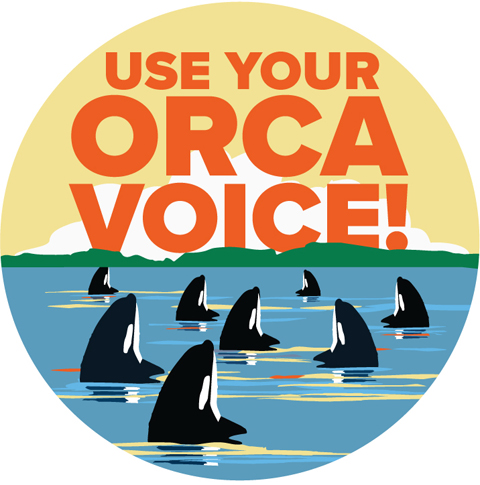
The Washington State Department of Fish and Wildlife (WDFW) is seeking public input on the rules for vessels operating near Southern Resident killer whales; this input will be used for a report to the legislature. Take this opportunity to speak up on behalf of the Southern Residents!
Here are our recommendations for your public input on some of the survey questions about the broader regulations aimed at reducing the impacts of vessels (including recreational boats) on Southern Residents. The survey is available until September 30.
What We Base Our Recommendations On: The WDFW adaptive management report that’s due to the legislature should base its recommendations on best available science and the precautionary principle, as recommended by the 2020 Washington State Academy of Sciences report, “[g]iven the fragile condition of the SRKW population.” Two recent studies (Holt et al January 2021 and Holt et al August 2021) show that the current regulations need to be revised. The distance between all boats and Southern Residents should be increased from the current 300/400 yards, and vessel speeds need to be reduced further than the current 7-knot requirement. Identifying and providing extra protections for where the whales are currently finding scarce prey (foraging hotspots) is also important. The NOAA study that documents how Southern Residents, especially females, stop foraging when boats approach closer than 400 yards is especially concerning in terms of population growth.
Below are Friends of the San Juans’ recommendations for the WDFW survey. Thank you for speaking up on behalf of the Southern Residents and the space they need to thrive!
Find the section of the survey, “I want to skip ahead to the questions about the broader regulations aimed at reducing impacts of vessels (including recreational boats) on SRKW”
- Depending on whether or not you boat recreationally in Washington waters, select “Yes,” or “No, but I want to give feedback on the general vessel rules for boating around SRKW”
- Under “Please rank the following aspects of boating around SRKW based on your perception of its importance to support SRKW recovery,” Friends recommends prioritizing these three selections:
- Avoiding approaching within a greater distance bubble (e.g, one-half nautical mile or 1000 yards) of SRKW
- Slowing down to a speed limit lower than 7 knots (e.g., 5 knots or 3 knots) within one-half nautical mile of SRKW
- Mandatory no-go or restricted activity zones in SRKW foraging hotspots
When the state considers its rules for boating around SRKW, what are the most important factors it should consider? (Choose up to 3)
- Rules that do what the science says will help the SRKW
- Precautionary rules to avoid as much impact on SRKW as possible
- Consequences
What is the top thing the state could do that you think would increase boater compliance with the rules?
- Enforcement: Increase the number of enforcement officers and boats. Enforce regulations with both on-water and remote enforcement. Impose significant fines.
Please share any specific recommendations for improvement of the state’s rules for operating vessels in the vicinity of Southern Resident killer whales:
- Require that all boats stay one-half nautical mile or 1000 yards away from Southern Residents.
- Emergency rules (when implemented to protect whales in poor health and/or newborn calves) should apply to recreational vessels, in addition to whale watching vessels.
- No-go or go-slow zones should be added to electronic navigation charts. AIS (Automatic identification system) can be monitored remotely as is done in Canada to monitor the Interim Sanctuary Zones off North Pender and Saturna Islands; boats are notified over VHF when they enter an Interim Sanctuary Zone.
- Extend the voluntary no-go zone on the west side of San Juan Island to reflect current science and to protect the current SRKW foraging habitat.
- If needed for enforcement, consider a mandatory no-go zone if that can address Tribal Treaty Rights.
